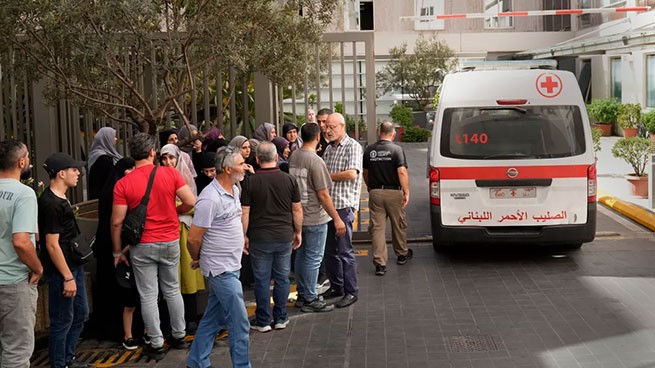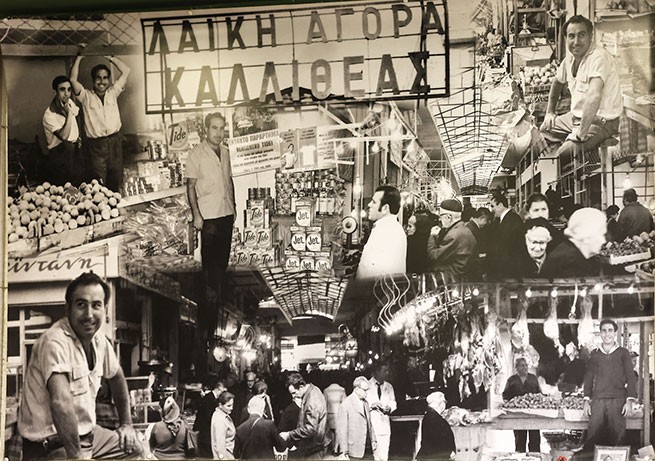Continuation of the story about the capital's market the Kallithea region, where they are closely intertwined history and modernity people from Pontus who founded and populated this area of Athens.
Irini Maroulidou: “Market Bride”

Irini never stops peeling, cutting and washing vegetables and fruits.
On the corner of the market is a grocery store where fruits and vegetables are laid out so perfectly that the boxes look like they came straight out of a cartoon. Irini Maroulidou sits on a stool among the fresh produce, peeling a pomegranate and placing the ready-to-eat seeds in a clear container.
Earlier, she also chopped and washed the greens that a regular customer and her daughter's friend came to buy. “ready-made”to prepare before leaving for the office. This is what Irini does every day while her daughter Julia sells their products. “We don't let my mom work with technology because every time we do, she does something crazy.”– her daughter says with a laugh. One day, Irini accidentally entered 400,000 euros into the cash register instead of 40 euros.
Irini has been working at the market since 1966, when she came to Athens from Messinia in the Peloponnese to get married. She was called “market bride” says her daughter Julia. She married her Pontic husband, who was already the second generation to own a grocery store – his parents were among the first Pontic people to establish a market.
Since then, and now into the third generation, Irini continues to come every day to make sure the produce is stored correctly. “Sunday is the only day I don't come”“Well, you need to rest too,” I tell her. “No, we just have to cook a lot to feed our children and grandchildren.”“I don’t,” she replies, confirming that the older generation of Greek women never seem to be able to sit down at the table.
And although all the old-timers know Irini, and regulars have become like friends for the store owners – they come, make purchases, share news, and can even sit down for a cup of coffee – Julia admits that “The world of the market has changed a lot. Something needs to be done to revive it. It remains the way it was built”. Still, she has found a way to attract younger shoppers who might not know exactly where her store is: She has listed it on delivery apps. So even as we speak, she is sneaking glances at her tablet to check if a new order has arrived.
Pericles Antonopoulos: The Influence of Nightclubs(?)

Father and son at work.
On the way to the second entrance to the market on Platonos Street, a song can be heard in the background “Prayer” Spyros Zagoraios. A few more steps and you realize it's coming from the grocery store's speakers. “Acropolis”In one corner, the youngest man in the store is cutting and weighing cheese behind the counter, while two others make small talk over coffee and a cigarette.
One of the two veterans of the market is Pericles Antonopoulos (no relation to the aforementioned Stavros Antonopoulos), who has been behind the counter for 52 years – he has become more sedate since his son Aristomenis took over. Yes, it almost looks like a theme shop, from the signs to the names – everything is reminiscent of Ancient Greece.
Pericles has been working in grocery stores since he was 10. When he joined the army, he was already tired of the idea and said to himself: “I will be anything in life, but not a grocer”But everything turns out in a funny way.
On December 12, 1972, Pericles first appeared as a store employee. “Acropolis” – this date was forever imprinted in his memory. He knew the previous owner of the store, which then worked as a retail outlet for the sausage factory of the same name. “I came for a short time and ended up staying for 50 years,” ” he says. Eventually, the original owner of Akropolis sold him the business to do something else. “To be a trader, you have to be tough.”says Pericles.

Sausage factory “Acropolis” was located in Tsitsifis, next to the grocery store where Pericles worked at the time, which was located among the night clubs that were then experiencing their heyday: “To become a singer, you had to go through a night club “Faliriko”“, Pericles recalls, referring to one of the most legendary nightclubs in the area, whose sign bears the names of such greats as Vasilis Tsitsanis, Panos Gavalas and Grigoris Bithikotsis.
Young Pericles suddenly found himself between two worlds: the morning world of the grocery store and the evening world of the nightclub that awaited him a few doors down. He carried groceries to the nightclubs – fruit on plates for customers, and ingredients for the workers to cook and eat.
One thing led to another, and he began working part-time at night, delivering food. “I used a tricycle to deliver food from warehouses to nightclubs all night long,” – Pericles recalls, and when dawn broke and the party ended, he helped clean up. “In those days we didn’t have brooms, we collected broken dishes into barrels with shovels,” – he recalls.
Supplying a nightclub with food seems more tedious than running a grocery store in the market. But Pericles points out that while the work in the clubs was hard, it was fun. In contrast, in the old days at the Acropolis, Pericles had to carry heavy loads by hand from the warehouse to the store. At least now his son Aristomenis has taken over, and Pericles can enjoy his favorite songs blasting from the speakers.

Fish and seafood arrive at the market early in the morning – boxes are unloaded as early as 5 am.
Chrysoula Kapiri: President

If you find yourself at the market, you will definitely see Chrysoulou.
Wherever you are in the market, you are sure to see Chrysoula Kapiri passing by. It is no surprise that she is the market president: she is outspoken, talkative and constantly on the alert. When she is not on the move, she is standing behind the counter of the market bakery that she owns.
She found herself here 30 years ago, when her children were 5 and 12 years old. “It was the market that helped me raise my children”” she says. She often speaks of her children with pride. One of her sons works as a photographer in Finland. Another is a pastry chef, so he helps out in the family business. Many family members have similar interests, and Chrisula got her interest in baking from her cousins, who were bakers.
“There are good people, fighters, in the market.”“It's a very exciting time,” the president says, noting that many changes have taken place in recent years. It's not without its challenges: The market is privately owned, so it doesn't receive any government or city funding, and it's difficult for the owners to renovate the building (which hasn't changed much) without outside help, she says.
However, she does not lose hope: “I think the market will hold up and we will continue to work here.”As for fatigue, she doesn’t mind because she is in her favorite place: “We older people have learned to work hard. I work more than I would anywhere else, but I don't mind, I like it.”

“It was the market that helped me raise my children,” says the market president.
Maria Hatzieremia: The Shy Florist

Maria (left) and Spiridula do their “aromatic” work at the market.
The market does not exist without its peripheral shops. Around the main shops, the tastes and smells continue to waft from small, carefully arranged shops. Opposite the entrance to the market on Platonos Street are small “jungle”which will attract the attention of even the most absent-minded passerby.
This is Maria Hatzieremia's flower shop, which sprawls across the back of a nearly deserted shopping mall. “Plato”and many colorful flower pots are displayed in two vans at the entrance. As Spiridoula Skortaniotou explained to me, they come to the shop every day at 7am to set out the flower pots, which are then put away and then collected every day. She has been working at the flower shop for 16 years and took it upon herself to tell us its history, as Maria is a bit shy – she is simply filling in some of the gaps.
In those days, when there were stalls on the streets and the market had not yet acquired the form we know today, Maria's mother had a shop a few meters from the current flower shop. Her grandparents were also refugees from Pontus, they were given land, and that's how they got this shop.
Long before concept stores brought the most unlikely of goods under one roof, a clear sign of the city’s gentrification, the family’s shop consisted of flowers for sale on one side and an art gallery on the other, as Maria’s father was an artist. However, he suddenly fell ill and died when Maria was just 6, leaving her mother with only the flower shop, which her daughter lovingly runs to this day.
All this happened in 1952, before the market was built and long before flower shops became the norm in every neighborhood. “I've been here since I was born”“- says Maria, and emotion can be heard in her voice.
Despite the two workers busy helping customers, Spiridula tells us that by their standards, business is not going well. I ask which plants are selling best. “It depends on the season– the worker tells me. Now, for example, the bestsellers are azaleas and cyclamens. In spring, anemones and freesias are the most popular.”
It requires care, it's work, and it “pleasant and aromatic”“, Spiridula tells us, wrapping up two cyclamen plants for us to take home as living souvenirs. Earlier, one excited customer left with a bright red carnation in hand, heading to meet a doctor friend.
Before leaving, we stopped by the flower shop's backyard – an open-air nursery where the open spaces of old residential buildings and a two-story flower shop building are adjacent. It's as if time had never passed.
Author Eleni Tzannatou.







More Stories
The Magic Number 56 and the Covered Market of Kalithea. Part 1
Istanbul pogrom, September 6-7, 1955
Türkiye Bans Patriarch Bartholomew from Serving at Panagia Sumela Monastery